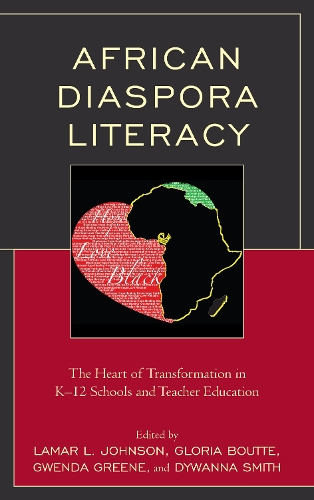
African Diaspora Literacy: The Heart of Transformation in K12 Schools and Teacher Education
(Paperback)
Available Formats
Publishing Details
African Diaspora Literacy: The Heart of Transformation in K12 Schools and Teacher Education
By (Author) Lamar L. Johnson
Edited by Gloria Boutte
Edited by Gwenda Greene
Edited by Dywanna Smith
Contributions by Saudah Collins
Contributions by Ntain Patience Chia
Contributions by Julia Dawson
Contributions by Antoinette Gibson
Contributions by Damara Hightower
Contributions by Rodrick Lando
Bloomsbury Publishing PLC
Lexington Books
4th June 2021
United States
Classifications
Professional and Scholarly
Non Fiction
Curriculum planning and development
Teaching skills and techniques
Secondary schools
372.6044
Physical Properties
Paperback
208
Width 151mm, Height 220mm, Spine 15mm
318g
Description
This book demonstrates the application of African Diaspora Literacy in K12 schools and teacher education programs. The book emerged from a four-week Fulbright-Hays Group Abroad project to Cameroon, West Africa, which was focused on African Diaspora Literacy. The project was guided by the African principle of Ubuntu (I am because we are). The 15-member team was comprised of eight faculty members (representing five universitiesBenedict College, Michigan State University, South Carolina State University, South University, and the University of South Carolina), one community member, two K12 administrators, and four K12 teachers from high need schools. The inclusion of such a diverse group of participants in the Kamtok project (e.g., professors, K12 teachers, community members) lent itself to producing rich data that captured both the intellectual scholarship and laypersons experience with equilateral consideration. The purpose of the project was to gain firsthand knowledge, artifacts, documents, experiences, and resources to be used in the development, implementation, and dissemination of curricula to be used in K12 schools and university classrooms to more effectively prepare educators to teach African American students.
Focusing specifically on the language, history, politics, economics, religion, and cultural traditions of people in the African Diaspora (e.g, U.S., Africa, Caribbean, the Americas, Europe, Asia), this book illuminates critical information typically missing from K12 schools and teacher education, and English curricula. Chapters are written by scholars from Cameroons as well as those from the U.S. The book represents a lovely compilation of application, theory, and research. The book explores how African Diaspora Literacy can be used to heal the endemic physical, symbolic, linguistic, curricula, pedagogical, and system violence that African American children and youth experience in schools and in society.
Reviews
Decades ago Black liberationist Marcus Garvey challenged Black Americans to return to Africa to heal from the ongoing racialized violence and trauma they faced and continue to face in the United States. Johnson, Boutte, Smith, and Greene revive this urgent call through African Diaspora Literacy by challenging P-20 educators to situate Mother Africa as the birthplace of all knowledges and histories, which, they and eleven contributing authors argue, must be reflected in schools, pedagogies and practices, and extant curricula. Centering and drawing on African-centered knowledge bases is the balm so many Black children need to heal their individual and collective wounds and souls from the quotidian anti-Black violence they confront in schools. This book is a must read for ELA and language and literacy scholars, teachers, and teacher educators who believe that #BlackLivesMatter, and who desire to enact pedagogies of healing through African Diaspora literacy.
-- Nathaniel Bryan, assistant professor, College of Education, Health, and Society, Miami UniversityAuthor Bio
Lamar L. Johnson is assistant professor of language and literacy for linguistic and racial diversity at Michigan State University.
Gloria Boutte is professor of instruction and teacher education at the University of South Carolina.
Gwenda R. Greene is associate professor of English at Benedict College.
Dywanna E. Smith holds a PhD in language and literacy from the University of South Carolina.
